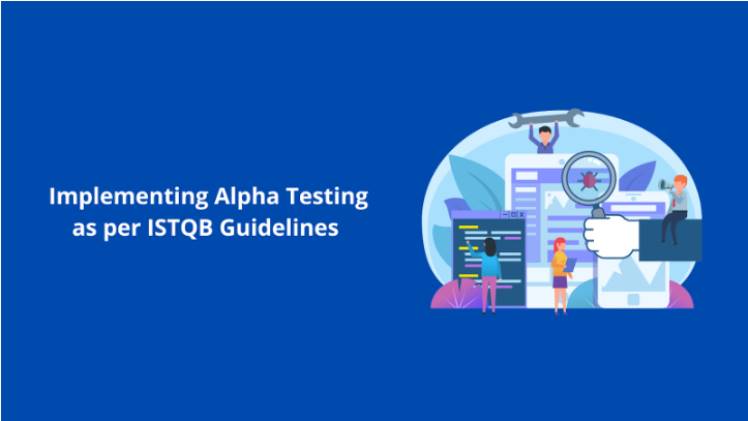Implementing Alpha Testing as per ISTQB Guidelines

The importance of assuring software program quality and dependability has increased. Software testing is crucial in this situation, and having a Software Testing Certification may greatly improve one’s knowledge and abilities in this area. “Alpha testing,” which adheres to the standards and concepts set out by the International Software Testing Qualifications Board (ISTQB), is an essential component of software testing. We will explore the complexities Alpha Testing in ISTQB in this blog and how it may be used to good use.
Table of contents
- Understanding Alpha Testing in ISTQB
- Implementing Alpha Testing as per ISTQB Guidelines
- Requirement Analysis
- Test Case Design
- Usability Evaluation
- Defect Reporting and Tracking
- Performance Evaluation
- Feedback Incorporation
- Conclusion
Understanding Alpha Testing in ISTQB
Alpha testing is a sort of acceptance testing that concentrates on evaluating the functionality and general performance of the software programme. Before the programme is made available to a larger public, it is tested in a controlled setting, usually by the internal development team. Alpha testing is a crucial stage in the development lifecycle of software since it aids in identifying any possible problems, flaws, or usability issues that need to be fixed before the product is made available to end users.
Alpha testing is incredibly important in terms of ISTQB standards. The ISTQB promotes a thorough grasp of testing methodologies and best practices by emphasising an organised and scientific approach to testing. Through ISTQB’s thorough course, aspirant testers and professionals pursuing a Software Testing Certification acquire an understanding of the subtleties of alpha testing.
Implementing Alpha Testing as per ISTQB Guidelines
Below are the steps to implement alpha testing:
Requirement Analysis
Before beginning alpha testing, STQB stresses the value of a comprehensive requirement analysis. Making relevant test cases requires an understanding of the software’s intended functionality, user base, and anticipated usage situations. This is consistent with the ISTQB’s guideline for creating efficient test cases based on clear requirements.
Test Case Design
The ISTQB promotes careful test case design that addresses a variety of circumstances. These scenarios cover edge situations, undesirable outcomes, and anticipated use cases. The objective is to identify probable flaws and vulnerabilities, in line with the ISTQB’s emphasis on thorough coverage.
Usability Evaluation
According to the ISTQB, alpha testing includes thoroughly analysing the software’s usability. The user interface, user experience, and general usability must all be evaluated in this process. Testing professionals make sure that the software is not only functional but also user-friendly by adhering to the ISTQB’s usability testing requirements.
Defect Reporting and Tracking
During alpha testing, the ISTQB advises a thorough approach to finding and reporting defects. Any errors discovered must be properly documented and come with steps to reproduce them. This approach aligns with the ISTQB’s emphasis on effective cooperation and communication within the development team.
Performance Evaluation
The importance of evaluating the software’s performance during alpha testing is emphasised in the ISTQB guidelines. This involves assessing its speed, load-carrying ability, and reactivity. The ISTQB’s performance testing recommendations provide testers with the assurance that the programme will meet users’ expectations under a range of circumstances.
Feedback Incorporation
During alpha testing, feedback from the internal testing team is routinely obtained. The ISTQB’s recommendations suggest including this critique in the testing process. This iterative approach aligns with the ISTQB’s concept of continuous improvement and guarantees that the software becomes more dependable with each iteration.
Conclusion
The ISTQB believes that the alpha testing stage of software development is essential. It adheres to predetermined principles and standards that promote rigorous testing, fault finding, and performance assessment. By obtaining a software testing certification and understanding these concepts, professionals may enhance their ability to execute alpha testing successfully. Alpha testing is successful because of the emphasis the ISTQB places on requirement analysis, detailed test case building, usability evaluation, defect reporting, performance assessment, and feedback assimilation.

